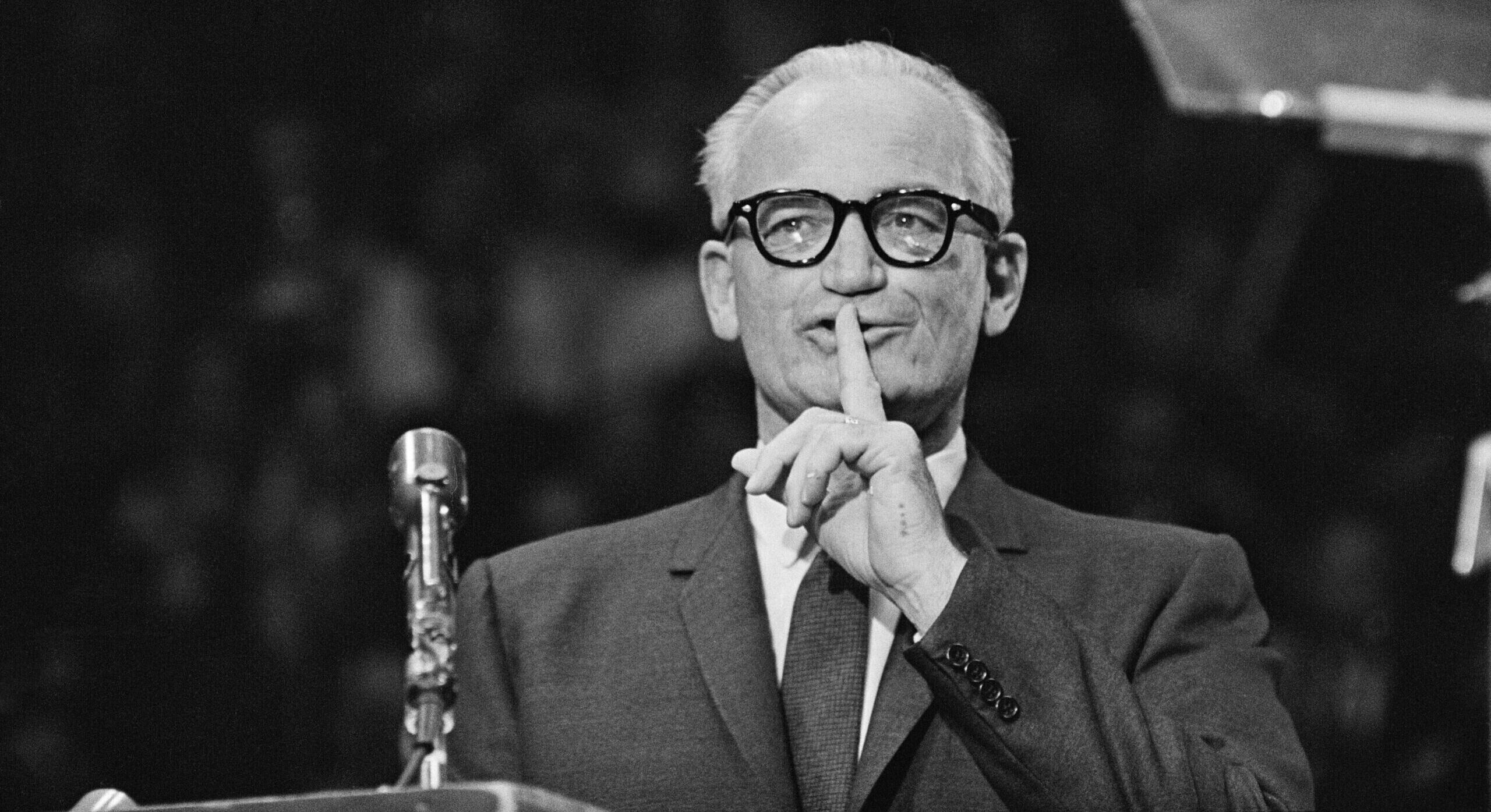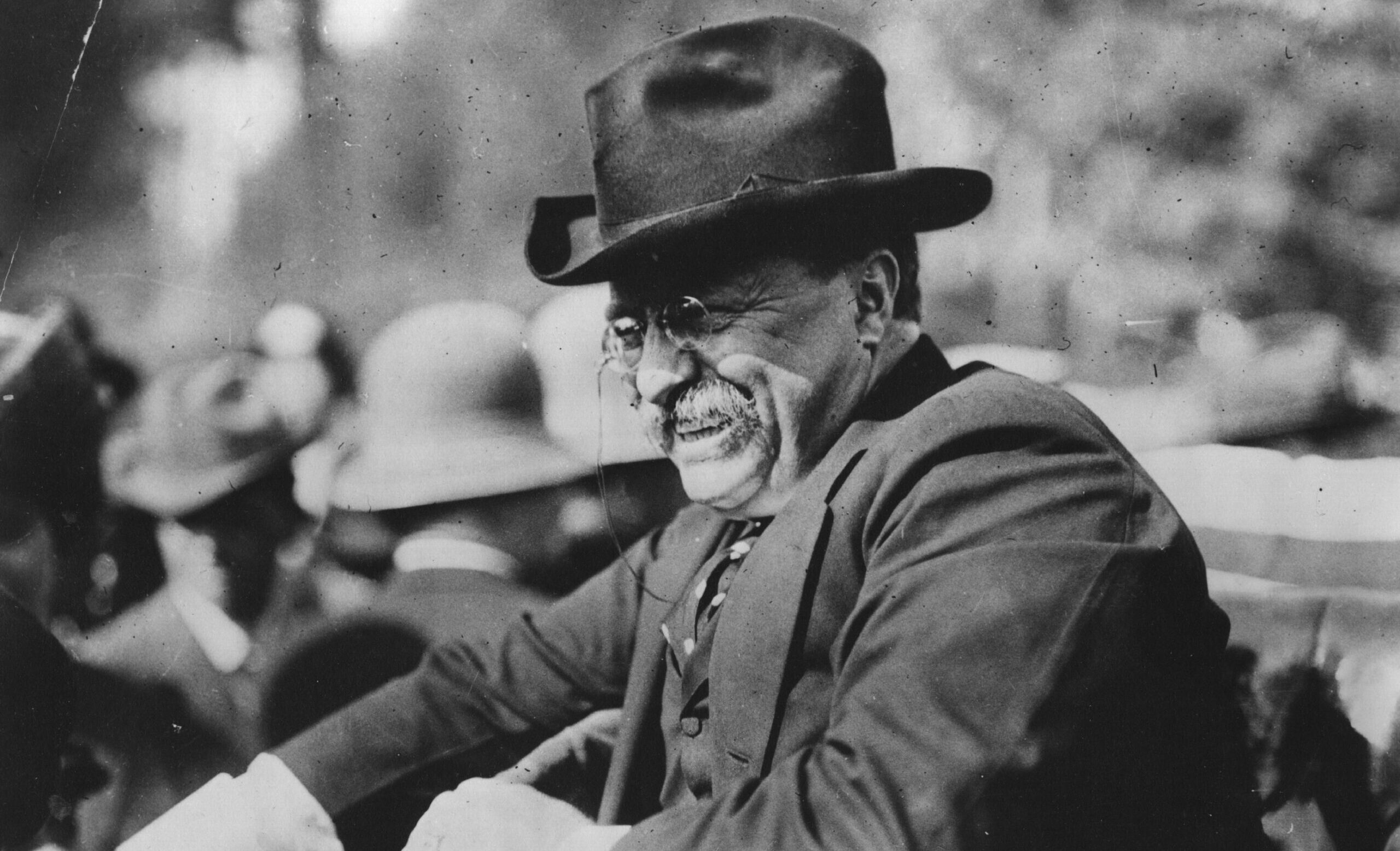The 1964 political campaign will be remembered, if for no other reason, as an interesting and unique test of the appeal of a straight conservative program on the part of a major political party. Since 1932 the Republicans, the right-of-center group in the American political spectrum, have come on evil days. In thirty-two years they have controlled the legislative branch only twice, and they have elected only one president, Dwight Eisenhower, who, as an uncommonly warm military hero, occupied a rather special super-party status.
There has been a prolonged discussion as to how the Republican party might best hope to renovate its fortunes. One theory, which prevailed until the San Francisco convention of 1964, was that the Republicans, as a minority party, could only hope to win the election by attracting the votes of a considerable number of independent voters and some disaffected Democrats. Therefore, so the argument ran, the ideal was to “modernize” the party outlook and offer a good deal of liberal bait in the platform. Conservatives could be taken for granted; they would vote Republican anyway. Hence the winning strategy would be to accept, in the main, the political, economic, and social legislative changes of the last generation, promising better performance and implementation, while criticizing only matters of detail, and to follow the same policy as regards foreign affairs.
Since 1936 this viewpoint has dictated the choice of party conventions. Wendell Willkie was preferred to more conservative figures in 1940. Thomas E. Dewey, an exponent of the policy of being all things to all men, was the candidate in 1944 and 1948. The outstanding principled conservative in the party councils, Senator Robert A. Taft, was passed over repeatedly and was finally rejected at the 1952 convention—on the ground that Eisenhower was a much surer winner.
This strategy, especially popular in the New England and Middle Atlantic states, did not go unchallenged in the area between the Alleghenies and the Rockies, where the party membership has always been more suspicious of the philosophy of “me-tooism.” The counter-arguments may be summarized as follows.
Hope of winning over any substantial number of Democrats or independents with leftist leanings was an illusion. The element among the voters who wanted high spending, high taxes, government intervention in the economy, and government social welfare on an expanded scale would vote Democratic in any case. With a straight unequivocal conservative program the Republican party could hope to tap two new sources of voters: conservatives who stayed at home on Election Day and Democrats in the Southern states alienated by the role of the federal government in overriding state legislation and a traditional way of life in the South in the name of a crusade for “civil rights.”
It can never be known with certainty which of these opposed interpretations of political strategy is correct. If Senator Goldwater is badly defeated, as his opponents predict, there would still be no proof that a “moderate, liberal” candidate, such as Scranton, Rockefeller, or Lodge, would have made a better showing.
For the benefit of political scientists and sociologists it would be interesting to hold two elections, one with Goldwater as the candidate, the other with the Republican ticket headed by a representative of the moderate wing of the party. Then the issue would be settled with finality. But, as this of course is impossible, the element of doubt as to what would have happened if a different candidate had been chosen will always remain.
The selection of Goldwater is a sharp break with the Republican political past, a sign of a wind of change.
Dominated by a solid majority of Goldwater sympathizers, the recent Republican convention cast to the winds what had been considered the fundamental rules of prudent practical politics. One such rule is to nominate the man with the fewest enemies, the man who could be expected to attract as many and repel as few voters as possible. The standard solution of the dilemma posed by the feud between the Goldwater conservatives and the Eastern wing of the party would have been to select neither Goldwater nor any of his prominent opponents, but rather the traditional “dark horse,” closely allied with neither group and capable of exerting a healing and conciliating influence.
Nothing of the kind. The Goldwater majority pushed its man through to victory and proceeded to tear up a few more traditional rules in the process. For instance, it has been customary to give the defeated group consolation prizes, such as the vice presidential nomination or some concessions in the framing of the platform.
This time the convention selected as the candidate for vice president a congressman of views very similar to Goldwater’s, a pugnacious, hard partisan fighter. And the platform, as any comparison of the two documents will show, was much more conservative than the corresponding statement of 1960, notably on the emotional issue of “civil rights.” All this is a reflection of the personality of the candidate, who throughout his terms of office in the Senate has repeatedly conveyed the impression that he would rather be Right than President. His vote against the civil rights bill, not on racist grounds but in line with a philosophical conviction that assumption of huge new supervisory functions by the federal government is contrary to the spirit and letter of the American Constitution, is a case in point. The nomination had not been settled at the time of this vote. Goldwater was taking a position contrary to that of most of his Republican colleagues in both houses of Congress. But loyalty to his convictions came ahead of possible considerations of expediency.
The selection of Goldwater is a sharp break with the Republican political past, a sign of a wind of change. It is a product of a number of factors, among which the personality of the Arizona senator is not the least. Even those who disagree strongly with his ideas usually concede his personal charm. An enthusiastic aviator and experimenter with radio and other gadgets, he is at the furthest imaginable remove from the image, or caricature, of the typical conservative as a stuffy, pompous individual with a built-in sour aversion to change and progress.
Not a dramatic orator, Goldwater is frank, outgoing, engaging as a speaker, ready to give thoughtful consideration and a reasoned answer to hostile or skeptical questions. Two years ago he came to Harvard University, not sympathetic territory, from an ideological standpoint, and made a generally favorable impression on predominantly student audiences which probably did not include many sympathizers.
He began to work for the conservative cause within the Republican party after the 1960 convention, when he refused to allow his name to be put in nomination because of its possible divisive effect. He has been an indefatigable speaker at Republican fundraising dinners all over the country and has developed friendly relations with active local leaders. This was of considerable help in preparing the way for his nomination.
Despite the fact that he has been represented as an impulsive man, inclined to shoot from the hip, he managed his campaign for the nomination with superb tactical skill, refusing to be drawn into direct controversies, forcing on his opponents the onus of attacking a fellow Republican. It was the “liberal” forces, not the “impulsive” Goldwater, who lost their heads at the climactic moment at San Francisco, as evidenced by the ill-conceived abusive letter to Goldwater prepared by a Scranton aide and sent under the governor’s signature, although he had not read it.
Internal factional struggles in the past have sometimes been embittered by the cry, “Stolen delegates.” There was no such taint about the nomination of Goldwater. He won on the first ballot with a clear majority of delegates, some of them chosen in primaries, others selected by state conventions. And the senator from Arizona has by far the most enthusiastic personal following, especially among the youth. In this connection the rise of conservative clubs and societies on university and college campuses has not been without effect. This, together with the publication of magazines favorable to conservative ideas and the appearance of such books as Friedrich Hayek’s Road to Serfdom and Russell Kirk’s Conservative Mind, has given conservatism an intellectual respectability which it scarcely possessed a generation ago.
Conservatism, like liberalism and socialism, has meant many things in differing contexts of time and national background. American conservatives are by no means in one hundred percent agreement as to their own credo. There is a line of difference as to emphasis, if not as to fundamental belief, between those who stress, with Burke, authority, tradition, and prescription and those conservatives who have retained much of the philosophy of nineteenth-century liberalism, with its belief in leaving the individual as free as possible to direct his own affairs.
Both of these schools of conservative thought, however, appeal to some emotion in the American consciousness. There is widespread concern among Americans who think of themselves as conservatives over the loss of valuable and important moral standards, the heritage of the past. And there is also considerable resentment against the tendency of centralized government to interfere in many aspects of what was once considered private life.
By and large American conservatives agree on the following broad principles:
- A foreign policy stripped of utopian trimmings and conceived primarily in terms of defending and promoting American interests
- Reserved scepticism about the efficacy of the polyglot United Nations as an instrument for maintaining peace and about the usefulness of foreign aid
- Contraction of the present enormous spread and scope of the powers of the federal bureaucracy
- Preference of self-help over state help
- Revision of the federal tax system along lines that would make it less punitive to success and more conducive to permitting individuals to take care of their own medical and other expenses and to build up income for years of retirement
- Maintenance of the constitutional rights of all American citizens, impartial enforcement of law and order, and firm repression of mob violence for any purpose and under any pretext
- Doubt whether law, however well-intentioned, can deal effectively with the attitudes of human beings toward each other
These are the ideals that Senator Goldwater may be expected to express between now and November. And for the first time in decades a presidential election will be a roll call for conservatives. With Goldwater as the Republican candidate, the theory, unproved and unprovable, that there is a large stay-at-home vote of disgruntled conservatives who have hitherto seen little difference between the two big parties will be thoroughly tested.
To be sure, the nature of American society, and of American politics, makes it difficult to conduct a nationwide election as a straight-out issue of right versus left, conservatism versus liberalism or radicalism.
The United States is a big country with a large variety of local traditions and regional interests. Public power, for instance, is a much bigger issue in some Western states than it is in the East. An attitude on the “civil rights” question that might make for victory in New York or Minnesota would be the equivalent of political suicide in Alabama or Mississippi. In European countries there are often several parties, each reflecting the views and interests of a certain segment of the voters. American tradition and the effect of the American voting system, with its absence of proportional representation, weights the scales in favor of the two-party system. There have been many “third party” movements in American history, but, except in the case when the young Republican party took over the inheritance of the Whigs, these have ended in futility and frustration.
Because of these circumstances, the Republican and Democratic parties are not closely knit, strongly disciplined organizations, committed to a definite, clear-cut philosophy. Although, in the main, the Republicans are right-of-center, the Democrats left-of-center, there are plenty of exceptions to this rule, depending on individual personality and local public opinion. The sturdiest opponents of the recently passed civil rights bill, for instance, were Southern Democrats.
No doubt some Republican state campaigns in the East will be run with little emphasis on Goldwater’s views. Still a political party stands or falls by the personality and views of its presidential candidate. Because President Johnson, up to the present time, has tried to convince businessmen that he has their interests at heart and to give his party an image suggesting center rather than left, the confrontation will not be as sharp as it would have been if Goldwater’s opponent had been a Democrat of a more left-wing stamp. But the Goldwater candidacy will be a significant, perhaps decisive test of the popular drawing power of straightforward, unqualified conservatism, an opportunity for all who consider themselves conservatives to stand up and be counted.
It is easy to count Goldwater out in advance, and at the present time the odds against him seem considerable. The liberal wing of the Republican party, especially strong in the East and Northeast, has been shaken and disappointed by his nomination and some defections, and a considerable amount of lukewarmness must be anticipated in this quarter. The opposition of Negroes, of strong trade unionists, of leftist intellectuals may be taken for granted. Much of the press, including some normally Republican newspapers, is so much opposed to the Arizona senator that his supporters are inclined to charge deliberate unfairness on the part of newspapers, radio, and other news media. And in some cases qualified statements by the senator have been played up into sensations by omitting the qualifications.
Most important of all, perhaps, the average American is inclined to vote pragmatically, not philosophically. Goldwater’s Conscience of a Conservative sold better than many more abstruse books on the subject. But the American voter, going into the polling booth, is not apt to cast his ballot for ideological considerations. He is more likely to think in terms of his present position in life, of the prospects for the future. For the majority of the population times are good, with a booming economy. And there is no special reason to anticipate a sharp change for the worse by November 3.
The normal impulse of businessmen and farmers, large and small, to vote Republican may be weakened by President Johnson’s assiduous efforts to convince them that he has their interests at heart and also by some unspoken fear that a drastic change in the existing system of state support of farm prices and subsidization of some industrial enterprises, however desirable in theory, might inflict considerable hardship and confusion in practice.
In short, if Goldwater in 1964 is defeated as badly as Alf Landon was in 1936, there will be plenty of reasons to explain this development. Should this occur, the traditional rulebook of practical politics, tossed away so blithely by the Republican convention, would probably reassert its authority. The more moderate wing of the Republican party might be expected to regain control of the leadership and future elections would be contested by both parties fairly close to the center of the road.
Yet the commentators who wrote off Goldwater as a possible nominee more than once have been proved wrong. There are several imponderable elements in the situation that would make it reckless to dismiss out of hand the possibility of a close race, even of an upset victory for the conservative challenger. Three such considerations may be listed, not necessarily in the order of relative importance.
For the first time since Theodore Roosevelt’s “Bull Moose” Progressive movement of 1912 there is a crusading element in the Republican candidacy. The senator’s dedicated stand for traditional conservative standards and values appeals to a number (how large, no one can say) of Americans who, despite abounding material prosperity, are concerned about tarnishes on the moral and spiritual image of their country.
The thunderous response at San Francisco to Senator Goldwater’s promise to make the streets safe for law-abiding citizens shows that he touched a sensitive chord. The appalling and disgraceful growth of crime, much of it of a violent nature, in American big cities, a development unmatched in any civilized country, is a cause of nonpartisan moral concern, to say nothing of concern for personal safety. Cases of corruption at national, state, and municipal levels and in trade unions are another discouraging sign of the times. A foreign policy that seems to aim at stalemate, not at victory, that is characterized by constant oscillation and vacillation, excites little enthusiasm. And there are the issues of extremely high taxation and ever-expanding extension of the powers of the federal bureaucracy.
In short Goldwater, to an enthusiastic following, is not just a politician seeking office; he is a patriotic prophet calling for national regeneration. The Goldwater conservatism of the present day is, of course, different in many aims and objectives from the progressive movement of fifty years ago; but there are emotional and psychological similarities.
There is also the unmeasured strength of what is called white backlash against tactics in the “civil rights” movement that lead to disorder and to such disastrous outbursts of senseless and criminal rioting as have occurred in New York and Rochester. And this resentment is felt most strongly not in the comfortable middle-class suburbs but in working-class and lower-middle-class neighborhoods in large cities that normally vote Democratic.
Had the adoption of the civil rights bill been followed by an abatement of racial tension this backlash would probably have subsided. But the reverse seems to have been the case. Every new outburst of looting, disorder, and mob violence may quite conceivably produce votes for Goldwater in the least likely districts. Not that the senator, who has repeatedly expressed his opposition to discrimination as morally wrong, who was influential in desegregating both his own commercial enterprises and the Arizona National Guard, is a racist. But his votes against cloture and against the civil rights bill will quite probably win him votes from those who are disturbed by outbreaks which strike at the foundations of civilized living.
Finally, there is the possibility of serious setbacks in foreign policy, especially in connection with the American involvement in Southeast Asia, where the prescription for victory in the struggle against communist subversion in Vietnam does not seem to have been found.
The injection into the 1964 election of a new and unfamiliar note of crusading conservatism opens up an uncertain prospect, depending on the unpredictable course of events at home and abroad and also upon the strength of certain emotional and psychological trends which cannot be measured by any sure political yardstick. Among the questions to which answers should be clearer on the morning of November 4 are the following:
Has there been in the past a large stay-at-home vote of disgruntled conservatives?
Is there a moral appeal in conservative ideals and values, set forth by an energetic and personally attractive candidate?
Were important segments of normally Republican voters alienated by the selection of Goldwater as the candidate?
How strong, and how translatable into votes, is white reaction to forced artificial integration of schools, to demonstrations that disturb public order, to rioting and violence?
William Henry Chamberlin was a historian and author.














